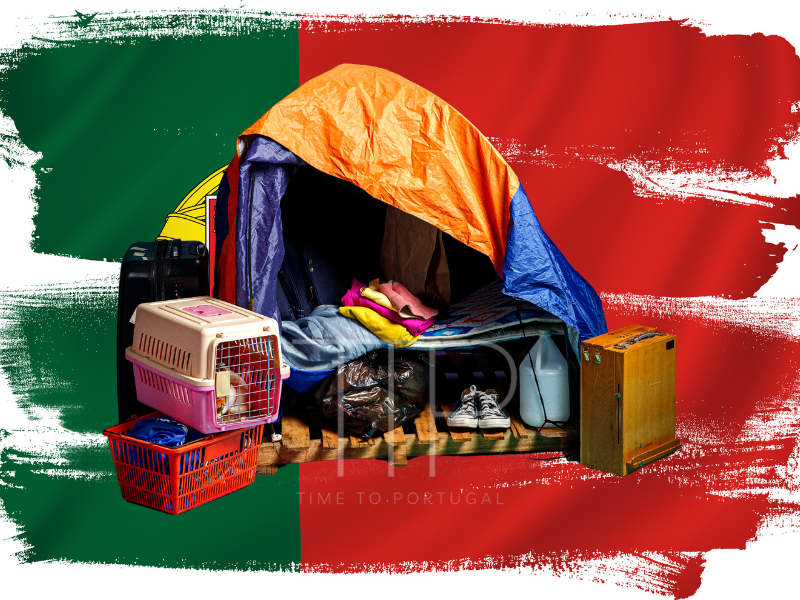Estimated growth of homeless immigrants in Lisbon is 25%. They arrive from Brazil, India, Nepal, Morocco, Gambia, Senegal, Angola and other countries and some have left behind a job in the Alentejo.
Between Gare do Oriente and Cais de Sodré station, passing through Rossio, in Lisbon, tents and small shelters made of cardboard are gathering, with immigrants outnumbering the Portuguese living on the streets.
All the homeless immigrants approached by Lusa this week were undocumented, although some had left behind a job in the Alentejo.
They’ve come from Brazil, India, Nepal, Morocco, Gambia, Senegal, Angola and many other countries, some of which can only communicate in English, and although life in Lisbon isn’t going well for them, especially with the winter wind and rain, very few of them want to go back to their countries, as they believe they’ll be able to work and organize their lives here.
For the time being, they live off the help of organizations such as Comunidade Vida e Paz, one of the most representative of the homeless.
Every evening at 8pm, the community’s vans leave from near Avenida dos Estados Unidos da América for various points in Lisbon, loaded with sandwiches, yogurt, blankets and other goods, such as clothing, that they know the homeless need.
On the night that Lusa accompanied the community volunteers, 190 bags of sandwiches were distributed, on a route where the majority are immigrants.
“We now have cheese-only sandwiches,” says volunteer Joana, pointing out that there are many Muslim immigrants who won’t eat ham because it’s made from pork. “No pork,” they warn.
“Immigrants account for a large part of the significant growth in the number of homeless people” in recent years, says Celestino Cunha, coordinator of Comunidade Vida e Paz. The growth estimated by this organization is 25%.
Wiston Dyone, a 39-year-old Brazilian who arrived from Brazil in 2019, the only foreign homeless man who agreed to be filmed, alongside Portuguese Arlindo Jesus, his companion in misfortune, explains why he’s there: “I’m going through a bad time. Almost five months ago I ended a marriage, I lost two daughters in the last year,” he told Lusa, a few days after leaving prison, where he spent Christmas and New Year’s Eve “for fighting” and breaking a shop window.
“And they keep calling me almost every day to pay 430 euros to bury my daughter, who I didn’t even have. Tomorrow I’m going there to see what happened to that (…) they didn’t even respect the mourning,” she complains.
But she assures me that she is trying to “readapt”. Claiming to have been working since he was 14, he says that, in Portugal, he has worked “on building sites, painting” and cites the names of the companies that have employed him, paying just five euros an hour, the same as he received in 2009, the other time he was in Portugal. “It’s absurd,” he says.
In Brazil he had a good life, he says, but he came because of his children, who were in Peniche. “So I chose Portugal as my home and I’m going to adapt,” he says. Returning to his country, despite the difficult situation he is living in, is out of the question for Wiston.
“I have my heart here” and, “until the storm passes, we have to try to learn from it”, he says, outside Arlindo’s tent, next to the viaduct on Avenida Infante Dom Henrique, which protects dozens of tents on the land and river sides. The important thing for Wiston Dyone “is not to stand still”, because in “a week at most” he hopes to be off the streets.
For the time being, he lost his passport and all his documents on the day of the brawl in December, which landed him in prison. Now he’s being asked for a photo ID to apply for a CPLP visa and he doesn’t have one.
Arlindo de Jesus quietly watches the conversation. When asked how many immigrants there are, he says: “There are three or four Brazilians here, half a dozen Portuguese and the rest are Nepalese, Indians and there are a lot of Moroccans here.”
Arlindo, 42, from Guimarães, also hopes to get out of there, but complains that the work he gets, unloading “some Chinese trucks”, for which he is paid between 10 and 30 euros a day, is not enough to pay for a house. He fell into the street in 2016, even managed to get out, but ended up going back, he says.
Further along, in Largo de São Carlos, under an arcade, is Sarabjit Singh. Barefoot, covered in a plaid blanket that hides his bare legs on the cardboard where he lies, one of them with a large wound on a swollen knee, the young Indian tells how he slipped on a rainy day on the Portuguese cobblestones and got sick. He didn’t go to the hospital, but went to a nearby pharmacy and found the support he needed to get better.
He came from Odemira, where he worked in agriculture, in search of more work in Lisbon, but he lost his documents, doesn’t speak Portuguese, no longer has a cell phone, shoes or pants and the only thing he has on is a cloth jacket and a shirt.
“I can’t work for the next seven days,” he says, looking frightened, confessing that she needs help.
When volunteer Alexandra gave him a pair of number 41 sneakers, he tried his best to put them on, but they didn’t fit and his eyes, which for a moment had a certain sparkle, lost it again.
Even so, the immigrant doesn’t even consider the possibility of returning to India. “No, I’m going to evolve, I really believe I’ll be able to work,” he says.

